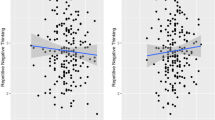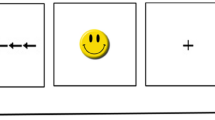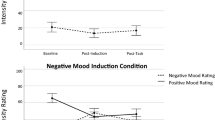Abstract
Altered attentional biases for emotional information are observed in populations with mood-related disorders. However, studies of emotion-related attentional biases in general populations have inconsistent findings. Inconsistencies may partially result from the use of average reaction time (RT) as a measure of attentional bias, which does not account for the RT distribution’s skewness or individual differences that influence RT but are unrelated to attention. 118 participants completed a word-based emotional flanker task and questionnaires on current mood, emotion regulation, and attention control. Participants responded more slowly, but more accurately, to negative than positive target trials. Applying the diffusion model to the data revealed an attentional bias (measured by drift rates) for negative over positive stimuli and an initial bias (measured by starting point) to positive responses overall. Furthermore, increased negative mood was associated with decreased attention control across all trials, though the relationship became anecdotal when participants with clinical levels of depressive symptoms were excluded. This study helps elucidate how current mood affects attentional biases towards emotional information in a general population and may contribute to research on altered attentional biases in mood-related psychiatric disorders.


Similar content being viewed by others
Data Availability
The datasets generated during and/or analysed during the current study are available from the corresponding author on reasonable request.
References
Alguacil, S., Tudela, P., & Ruz, M. (2013). Cognitive and affective control in a flanker word task: Common and dissociable brain mechanisms. Neuropsychologia, 51(9), 1663–1672.
Anderson, E., Siegel, E. H., & Barrett, L. F. (2011). What you feel influences what you see: The role of affective feelings in resolving binocular rivalry. Journal of Experimental Social Psychology, 47(4), 856–860. https://doi.org/10.1016/j.jesp.2011.02.009.
Bardeen, J. R., Daniel, T. A., Hinnant, J. B., & Orcutt, H. K. (2017). Emotion dysregulation and threat-related attention bias variability. Motivation and Emotion, 41(3), 402–409. https://doi.org/10.1007/s11031-017-9604-zx.
Barratt, D., & Bundesen, C. (2012). Attentional capture by emotional faces is contingent on attentional control settings. Cognition and Emotion, 26(7), 1223–1237. https://doi.org/10.1080/02699931.2011.645279.
Bastian, B., Pe, M. L., & Kuppens, P. (2017). Perceived social pressure not to experience negative emotion is linked to selective attention for negative information. Cognition and Emotion, 31(2), 261–268.
Beck, A. T. (1979). Cognitive therapy of depression. Guilford press.
Beck, A. T., Steer, R. A., & Brown, G. K. (1996). Beck depression inventory-II. San Antonio, 78(2), 490–498.
Becker, M. W., & Leinenger, M. (2011). Attentional selection is biased toward mood-congruent stimuli. Emotion, 11(5), 1248–1254. https://doi.org/10.1037/a0023524.
Bradley, M. M., & Lang, P.J. (1999). Affective norms for English words (ANEW): Instruction manual and affective ratings. Technical report C-1, the Center for Research in psychophysiology, University of Florida.
Breiter, H. C., Etcoff, N. L., Whalen, P. J., Kennedy, W. A., Rauch, S. L., Buckner, R. L., Strauss, M. M., Hyman, S. E., & Rosen, B. R. (1996). Response and habituation of the human amygdala during visual processing of facial expression. Neuron, 17(5), 875–887. https://doi.org/10.1016/S0896-6273(00)80219-6.
Buuren, S. V., & Groothuis-Oudshoorn, K. (2011). Mice: Multivariate imputation by chained equations in R. Journal of statistical software, 45(3), 1-67. URL https://www.jstatsoft.org/v45/i03/.
Cheng, P., Preston, S. D., Jonides, J., Mohr, A. H., Thummala, K., Casement, M., Hsing, C., & Deldin, P. J. (2015). Evidence against mood-congruent attentional bias in major depressive disorder. Psychiatry Research, 230(2), 496–505. https://doi.org/10.1016/j.psychres.2015.09.043.
Chepenik, L. G., Cornew, L. A., & Farah, M. J. (2007). The influence of sad mood on cognition. Emotion, 7(4), 802–811. https://doi.org/10.1037/1528-3542.7.4.802.
Cisler, J. M., & Koster, E. H. W. (2010). Mechanisms of attentional biases towards threat in anxiety disorders: An integrative review. Clinical Psychology Review, 30(2), 203–216. https://doi.org/10.1016/j.cpr.2009.11.003.
Costa, P. T., & McCrae, R. R. (1980). Influence of extraversion and neuroticism on subjective well-being: Happy and unhappy people. Journal of Personality and Social Psychology, 38(4), 668–678. https://doi.org/10.1037/0022-3514.38.4.668.
DeCoster, J., & O’Mally, J. (2011). Specific sequence effects in the serial reaction time task. Journal of Motor Behavior, 43(3), 263–273. https://doi.org/10.1080/00222895.2011.574171.
Derryberry, D., & Reed, M. A. (2002). Anxiety-related attentional biases and their regulation by attentional control. Journal of Abnormal Psychology, 111(2), 225–236. https://doi.org/10.1037/0021-843X.111.2.225.
Donaldson, C., Lam, D., & Mathews, A. (2007). Rumination and attention in major depression. Behaviour Research and Therapy, 45(11), 2664–2678. https://doi.org/10.1016/j.brat.2007.07.002.
Faul, F., Erdfelder, E., Buchner, A., & Lang, A.-G. (2009). Statistical power analyses using G*power 3.1: Tests for correlation and regression analyses. Behavior Research Methods, 41, 1149–1160.
Fenske, M. J., & Eastwood, J. D. (2003). Modulation of focused attention by faces expressing emotion: Evidence from flanker tasks. Emotion, 3(4), 327–343. https://doi.org/10.1037/1528-3542.3.4.327.
García-Blanco, A. C., Perea, M., & Livianos, L. (2013). Mood-congruent bias and attention shifts in the different episodes of bipolar disorder. Cognition and Emotion, 27(6), 1114–1121. https://doi.org/10.1080/02699931.2013.764281.
Gratz, K. L., & Roemer, L. (2004). Multidimensional assessment of emotion regulation and dysregulation: Development, factor structure, and initial validation of the difficulties in emotion regulation scale. Journal of Psychopathology and Behavioral Assessment, 26, 41–54. https://doi.org/10.1023/b:joba.0000007455.08539.94.
Hur, J., Gaul, K., & Berenbaum, H. (2019). Different patterns of attention bias in worry and rumination. Cognitive Therapy and Research, 43(4), 713–725. https://doi.org/10.1007/s10608-018-09993-4.
Judah, M. R., Grant, D. M., Mills, A. C., & Lechner, W. V. (2014). Factor structure and validation of the attentional control scale. Cognition and Emotion, 28(3), 433–451. https://doi.org/10.1080/02699931.2013.835254.
Kanske, P., & Kotz, S. A. (2011). Emotion speeds up conflict resolution: A new role for the ventral anterior cingulate cortex? Cerebral Cortex, 21(4), 911–919.
Keller, A. S., Leikauf, J. E., Holt-Gosselin, B., Staveland, B. R., & Williams, L. M. (2019). Paying attention to attention in depression. Translational Psychiatry, 9(1), 1–12. https://doi.org/10.1038/s41398-019-0616-1.
Khosravi, P., Parker, A. J., Shuback, A. T., & Adleman, N. E. (2020). Attention control ability, mood state, and emotional regulation ability partially affect executive control of attention on task-irrelevant emotional stimuli. Acta Psychologica, 210, 103169. https://doi.org/10.1016/j.actpsy.2020.103169.
Koster, E. H. W., De Raedt, R., Goeleven, E., Franck, E., & Crombez, G. (2005). Mood-congruent attentional bias in dysphoria: Maintained attention to and impaired disengagement from negative information. Emotion, 5(4), 446–455. https://doi.org/10.1037/1528-3542.5.4.446.
Koster, E. H. W., De Raedt, R., Leyman, L., & De Lissnyder, E. (2010). Mood-congruent attention and memory bias in dysphoria: Exploring the coherence among information-processing biases. Behaviour Research and Therapy, 48(3), 219–225. https://doi.org/10.1016/j.brat.2009.11.004.
Lipp, O. V., & Derakshan, N. (2005). Attentional bias to pictures of fear-relevant animals in a dot probe task. Emotion, 5(3), 365–369. https://doi.org/10.1037/1528-3542.5.3.365.
MacLeod, C., Mathews, A., & Tata, P. (1986). Attentional bias in emotional disorders. Journal of Abnormal Psychology, 95(1), 15–20. https://doi.org/10.1037/0021-843X.95.1.15.
Maire, H., Brochard, R., Kop, J. L., Dioux, V., & Zagar, D. (2017). Effect of emotions in a lexical decision task: A diffusion model analysis. Swiss Journal of Psychology, 76(2), 71–79. https://doi.org/10.1024/1421-0185/a000193.
Morey, R., & Rouder, J. (2018). BayesFactor: Computation of Bayes factors for common designs. R package version 0.9.12–4.2. https://CRAN.R-project.org/package=BayesFactor
Mueller, C. J., & Kuchinke, L. (2016a). Individual differences in emotion word processing: A diffusion model analysis. Cognitive, Affective, & Behavioral Neuroscience, 16(3), 489–501. https://doi.org/10.3758/s13415-016-0408-5.
Mueller, C. J., & Kuchinke, L. (2016b). Processing of face identity in the affective flanker task: A diffusion model analysis. Psychological Research, 80(6), 963–973. https://doi.org/10.1007/s00426-015-0696-3.
Okon-Singer, H. (2018). The role of attention bias to threat in anxiety: Mechanisms, modulators and open questions. Current Opinion in Behavioral Sciences, 19, 26–30. https://doi.org/10.1016/j.cobeha.2017.09.008.
Parra, M. A., Sánchez, M. G., Valencia, S., & Trujillo, N. (2018). Attentional bias during emotional processing: Evidence from an emotional flanker task using IAPS. Cognition and Emotion, 32(2), 275–285. https://doi.org/10.1080/02699931.2017.1298994.
Pe, M. L., Vandekerckhove, J., & Kuppens, P. (2013). A diffusion model account of the relationship between the emotional flanker task and rumination and depression. Emotion, 13(4), 739–747. https://doi.org/10.1037/a0031628.
Peckham, A. D., McHugh, R. K., & Otto, M. W. (2010). A meta-analysis of the magnitude of biased attention in depression. Depression and Anxiety, 27(12), 1135–1142. https://doi.org/10.1002/da.20755.
Pessoa, L., Kastner, S., & Ungerleider, L. G. (2002). Attentional control of the processing of neutral and emotional stimuli. Cognitive Brain Research, 15(1), 31–45. https://doi.org/10.1016/S0926-6410(02)00214-8.
Psychology Software Tools, Inc. [E-Prime 2.0]. (2012). Retrieved from https://www.pstnet.com.
R Core Team (2018). R: A language and environment for statistical computing (Version 3.5.2). R Foundation for Statistical Computing. http://www.R-project.org/
Raftery, A. E. (1995). Bayesian model selection in social research. Sociological Methodology, 25, 111–163. https://doi.org/10.2307/271063.
Ratcliff, R., & Rouder, J. N. (1998). Modeling response times for two-choice decisions. Psychological Science, 9(5), 347–356. https://doi.org/10.1111/1467-9280.00067.
Schmeichel, B., Volokhov, R., & Demaree, H. (2009). Working memory capacity and the self-regulation of emotional expression and experience. Journal of Personality and Social Psychology, 95, 1526–1540. https://doi.org/10.1037/a0013345.
Shaw, P., Stringaris, A., Nigg, J., & Leibenluft, E. (2014). Emotion dysregulation in attention deficit hyperactivity disorder. American Journal of Psychiatry, 171(3), 276–293. https://doi.org/10.1176/appi.focus.140102.
Thoern, H. A., Grueschow, M., Ehlert, U., Ruff, C. C., & Kleim, B. (2016). Attentional bias towards positive emotion predicts stress resilience. PLoS One, 11(3), e0148368. https://doi.org/10.1371/journal.pone.0148368.
Tipples, J. (2019). Recognising and reacting to angry and happy facial expressions: A diffusion model analysis. Psychological Research, 83(1), 37–47. https://doi.org/10.1007/s00426-018-1092-6.
Treynor, W., Gonzalez, R., & Nolen-Hoeksema, S. (2003). Rumination reconsidered: A psychometric analysis. Cognitive Therapy and Research, 27(3), 247–259. https://doi.org/10.1023/A:1023910315561.
Vandekerckhove, J., Tuerlinckx, F., & Lee, M. D. (2011). Hierarchical diffusion models for two-choice response times. Psychological Methods, 16(1), 44–62. https://doi.org/10.1037/a0021765.
Wagenmakers, E.-J., Marsman, M., Jamil, T., Ly, A., Verhagen, J., Love, J., & Morey, R. D. (2018). Bayesian inference for psychology. Part I: Theoretical advantages and practical ramifications. Psychonomic Bulletin & Review, 25(1), 35–57. https://doi.org/10.3758/s13423-017-1343-3.
Watson, D., Clark, L. A., & Tellegen, A. (1988). Development and validation of brief measures of positive and negative affect: The PANAS scales. Journal of Personality and Social Psychology, 54(6), 1063–1070. https://doi.org/10.1037/0022-3514.54.6.1063.
White, C., Ratcliff, R., Vasey, M., & McKoon, G. (2009). Dysphoria and memory for emotional material: A diffusion-model analysis. Cognition and Emotion, 23(1), 181–205. https://doi.org/10.1080/02699930801976770.
White, C. N., Liebman, E., & Stone, P. (2018). Decision mechanisms underlying mood-congruent emotional classification. Cognition and Emotion, 32(2), 249–258. https://doi.org/10.1080/02699931.2017.1296820.
White, L. K., Suway, J. G., Pine, D. S., Bar-Haim, Y., & Fox, N. A. (2011). Cascading effects: The influence of attention bias to threat on the interpretation of ambiguous information. Behaviour Research and Therapy, 49(4), 244–251. https://doi.org/10.1016/j.brat.2011.01.004.
Wiecki, T. V., Sofer, I., & Frank, M. J. (2013). HDDM: Hierarchical Bayesian estimation of the drift-diffusion model in Python. Frontiers in Neuroinformatics, 7. https://doi.org/10.3389/fninf.2013.00014.
Yiend, J. (2010). The effects of emotion on attention: A review of attentional processing of emotional information. Cognition and Emotion, 24(1), 3–47. https://doi.org/10.1080/02699930903205698.
Acknowledgements
We would like to acknowledge the contributions of Parmis Khosravi and Emily Fair, who were essential in the set up and data collection phases of this study.
Author information
Authors and Affiliations
Corresponding author
Ethics declarations
Ethical Statement
All procedures performed were in accordance with the ethical standards of the institutional research committee (Committee for the Protection of Human Subjects, reference number 17–075) and with the 1964 Helsinki declaration and its later amendments or comparable ethical standards.
Informed Consent
Informed consent was obtained from all individual participants included in the study.
Conflict of Interest
The authors declare that they have no conflict of interest.
Additional information
Publisher’s Note
Springer Nature remains neutral with regard to jurisdictional claims in published maps and institutional affiliations.
Supplementary Information
ESM 1
(DOCX 52.5 kb)
Rights and permissions
About this article
Cite this article
Parker, A.J., Adleman, N.E. Current mood influences biases for positive and negative stimuli. Curr Psychol 42, 3769–3779 (2023). https://doi.org/10.1007/s12144-021-01686-8
Accepted:
Published:
Issue Date:
DOI: https://doi.org/10.1007/s12144-021-01686-8




